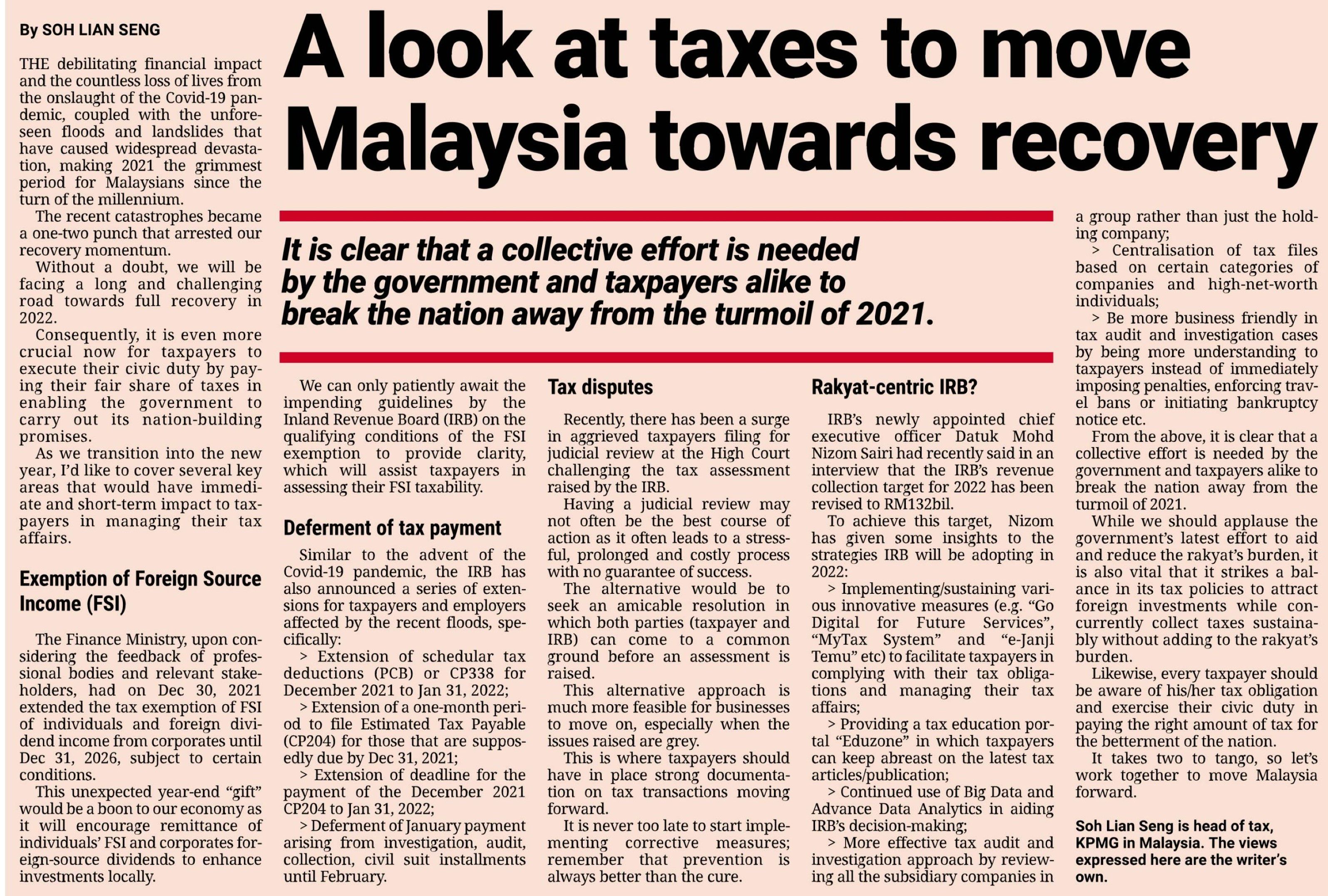The debilitating financial impact and the countless loss of lives from the onslaught of the Covid-19 pandemic, coupled with the unforeseen floods and landslides that have caused widespread devastation, making 2021 the grimmest period for Malaysians since the turn of the millennium.
The recent catastrophes became a one-two punch that arrested our recovery momentum.
Without a doubt, we will be facing a long and challenging road towards full recovery in 2022.
Consequently, it is even more crucial now for taxpayers to execute their civic duty by paying their fair share of taxes in enabling the government to carry out its nation-building promises.As we transition into the new year, I’d like to cover several key areas that would have immediate and short-term impact to taxpayers in managing their tax affairs.
Exemption of Foreign Source Income (FSI)
The Finance Ministry, upon considering the feedback of professional bodies and relevant stakeholders, had on Dec 30, 2021 extended the tax exemption of FSI of individuals and foreign dividend income from corporates until Dec 31, 2026, subject to certain conditions.
This unexpected year-end “gift” would be a boon to our economy as it will encourage remittance of individuals’ FSI and corporates foreign-source dividends to enhance investments locally.
We can only patiently await the impending guidelines by the Inland Revenue Board (IRB) on the qualifying conditions of the FSI exemption to provide clarity, which will assist taxpayers in assessing their FSI taxability.
Deferment of tax payment
Similar to the advent of the Covid-19 pandemic, the IRB has also announced a series of extensions for taxpayers and employers affected by the recent floods, specifically:
- Extension of schedular tax deductions (PCB) or CP338 for December 2021 to Jan 31, 2022;> Extension of a one-month period to file Estimated Tax Payable (CP204) for those that are supposedly due by Dec 31, 2021;
- Extension of deadline for the payment of the December 2021 CP204 to Jan 31, 2022;
- Deferment of January payment arising from investigation, audit, collection, civil suit installments until February.
Tax disputes
Recently, there has been a surge in aggrieved taxpayers filing for judicial review at the High Court challenging the tax assessment raised by the IRB.
Having a judicial review may not often be the best course of action as it often leads to a stressful, prolonged and costly process with no guarantee of success.
The alternative would be to seek an amicable resolution in which both parties (taxpayer and IRB) can come to a common ground before an assessment is raised.
This alternative approach is much more feasible for businesses to move on, especially when the issues raised are grey.
This is where taxpayers should have in place strong documentation on tax transactions moving forward.
It is never too late to start implementing corrective measures; remember that prevention is always better than the cure.
Rakyat-centric IRB?
IRB’s newly appointed chief executive officer Datuk Mohd Nizom Sairi had recently said in an interview that the IRB’s revenue collection target for 2022 has been revised to RM132bil.
To achieve this target, Nizom has given some insights to the strategies IRB will be adopting in 2022:
- Implementing/sustaining various innovative measures (e.g. “Go Digital for Future Services”, “MyTax System” and “e-Janji Temu” etc) to facilitate taxpayers in complying with their tax obligations and managing their tax affairs;
- Providing a tax education portal “Eduzone” in which taxpayers can keep abreast on the latest tax articles/publication;
- Continued use of Big Data and Advance Data Analytics in aiding IRB’s decision-making;
- More effective tax audit and investigation approach by reviewing all the subsidiary companies in a group rather than just the holding company;
- Centralisation of tax files based on certain categories of companies and high-net-worth individuals;> Be more business friendly in tax audit and investigation cases by being more understanding to taxpayers instead of immediately imposing penalties, enforcing travel bans or initiating bankruptcy notice etc.
From the above, it is clear that a collective effort is needed by the government and taxpayers alike to break the nation away from the turmoil of 2021.
While we should applause the government’s latest effort to aid and reduce the rakyat’s burden, it is also vital that it strikes a balance in its tax policies to attract foreign investments while concurrently collect taxes sustainably without adding to the rakyat’s burden. Likewise, every taxpayer should be aware of his/her tax obligation and exercise their civic duty in paying the right amount of tax for the betterment of the nation.
It takes two to tango, so let’s work together to move Malaysia forward.
Soh Lian Seng is head of tax, KPMG in Malaysia. The views expressed here are the writer’s own.
Read the full article via the link below:
The Star : A look at taxes to move Malaysia towards recovery

